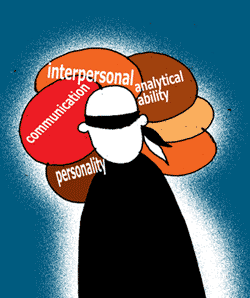Photographs: Illustration by Uttam Ghosh
The other day I helped a student move from a Bachelor's in English literature to a Master's in Environmental Management.
The diverse nature of the two career choices set me thinking. Is there only one career that we are all destined to succeed in?
I am sure when she was growing up she would never have said that she was going to be thinking about carbon credits or managing the carbon footprints in this world. Yet, if all goes well then that is what she will end up doing.
When she had come to my office she was full of anxiety, unsure what the pursuit of English literature would lead her to and not wanting the typical career routes that most English literature majors choose.
The anxiety was palpable in the room and it made me think of the very large majority of the students for whom career decision is a super-charged anxious moment. One decision has the potential to change our lives forever. Yet, does it really change our lives? I think it does.
Click NEXT to continue
How do we know 'this is it'?
Image: If you are alert, you can seize opportunities and exploit them to the fullestWhat you choose to study can have an impact on your complete life. However, does a wrong choice have the capacity to ruin your life? I think not.
Life gives us many opportunities to fine-tune our decisions and sometimes a prospect can completely change the course of our lives. If you are alert, you can seize some of these opportunities and exploit them to the fullest.
Getting it right
The big question that most people have in their minds is: When an opportunity comes our way, how do we know "this is it"? I think the art and science of career counselling rests on the premise that there can be 'this-is-it' moments in each person's life.
Let's step back from the anxious decision making process of career planning and think about other things. For instance, how do you know when a dress fits you and suits you well?
Most of us have at some point in our lives spent a few hours looking at ourselves in the mirror, gone to more than one shop to try out a different dress, checking which colours suit our complexion or which styles go well on our body type.
Most of us attempt not to wear the dress our friends will wear; in fact some of us will go to great lengths to look different. All of this for one dress which we might wear on no more than 20 to 30 days of our life before casting it off.
When it comes to choosing a career, we want to do what everybody else is doing: go to the same few institutions that everybody is going to and find it safe not to analyse our own strengths, weaknesses, passions, interests, etc.
Somehow we no longer want to remain analytical, be ourselves, and try out different hats before we settle on "the one".
Click NEXT to continue
Interest and passion play a major role
Let's cast that same investigative eye on our innermost being and see what we come up with and how we can use that information to make sound career decisions. Why is it important to identify the careers that you could be good at?
A career is something you will use for at least eight hours a day, 365 days a year for several years if not your whole life. So it might be worthwhile to choose a career that goes well with your personality. Personality is made up, amongst others, of interests and passions.
Both interest and passion play a major role in the successful use of your skills. If you are interested in buildings, architecture and generally the use of space, then as an engineer you are more likely to be successful as a civil engineer rather than as an electronic engineer.
Similarly, if you are good with people, enjoy motivating them, interested in doing activities with them or just enjoy talking to them, you are equally likely to succeed at being an HR manager, marketing person, trainer, educator, counsellor, tour guide, etc.
Click NEXT to continue
Some want to be rich and successful, others want to retire at 40
Image: Following dreams and passions seem to be revered in the fantasy world of cinemaEach one of us has some innate abilities which we use as building blocks in our life.
Some people call it 'flair', others 'talent,' and we career counsellors call it 'aptitude' for something. Does that mean that if we are not born with something, we cannot develop it? Luckily, the answer to that is also a 'No'.
We can sharpen the tools we were born with and make that ability razor sharp. Fortunately, with specific training we can also pick new abilities and skills that will make us more versatile and well-rounded human beings.
I know the only goal of some students is: "I want to be rich and successful". Others will also talk about "retiring at 40".
Somehow, following your dreams and passions seems to be revered in the fantasy world of cinema. But in the real world it is the dream of a secure career that will also allow a five-star life that seems to propel most people.
When you meet successful people in the real world, I am sure not all of them are engineers, doctors, etc. Some of them are journalists, psychologists and chefs, and some plain BAs or BComs. And some, hold your breath, without any formal qualification.
That means each of them, no matter which career they chose, somehow stuck to their guns and achieved their goals.
Click NEXT to continue
How to analyse yourself
Photographs: Illustration by Dominic Xavier
In the coming months, we will take a closer look at how we can identify our strengths, weaknesses, interests, values and set a plan of action for ourselves that will be flexible, achievable and ensure not only success but also long-term happiness.
Useful aptitude tests you can consider
- Myers-Briggs Type Indicator
- Occupational Personality Questionnaire
- Five Factor Personality Inventory -- Children
- The Animal Metaphor Test
- Robert's Apperception Test
- Attachment Projective
- Also, visit www.accreditedonlinecolleges.com






Comment
article